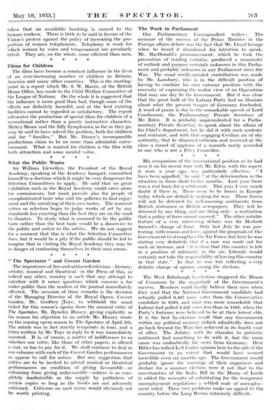The West Edinburgh by-election staggered the House of Commons by
the magnitude of the Government's success. Members could hardly believe their eyes when they read that the National Government candidate had actually polled 3,407 more otes than • the Conservative candidate in 1929, and what was more remarkable that Labour had polled 2,242 votes less than in 1931, when the Party's fortunes were believed to be at their lowest ebb. It is the best by-election result that any Government within my political memory (which admittedly does not go back beyond the War) has achieved in its fourth Year of office. The Jubilee, with its stimulus to patriotic sentiment had, something to do with it, but the main cause was undoubtedly the news from Germany. Herr Hitler has rallied Left Centre opinion hereto the side of the Government to an extent that would have seemed incredible even six months ago. The Government would probably ignore the warnings of their organizers and declare for a summer election were it not that to the uncertainties of the India Bill in the' House of Lords is added the necessity of substituting for the temporary unemployment regulations a settled scale of unemploy- ment relief. These two problems make an appeal to the country before the Long Recess extremely difficult.


































































 Previous page
Previous page